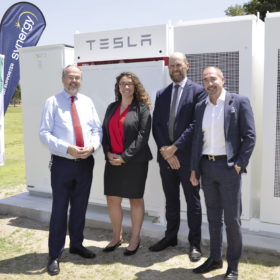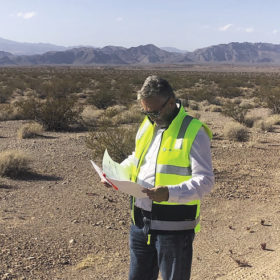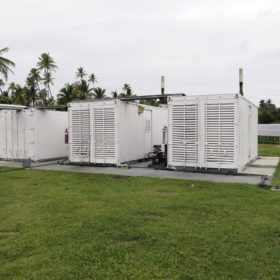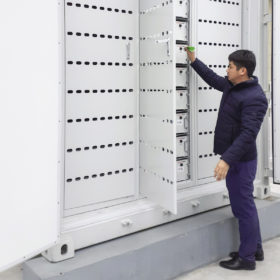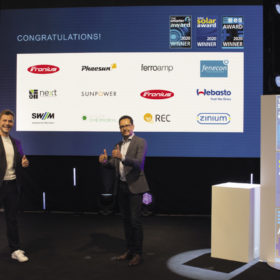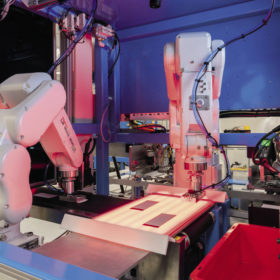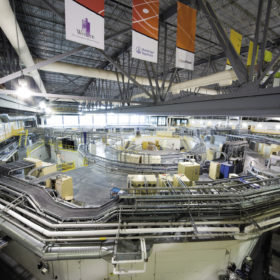Investing in PowerBanks for high returns
Western Australia is soaked in sunshine, and PV uptake is challenging the grid. But small numbers of medium-sized community batteries are taking the heat off the system, while helping more people to reap the dividends of rooftop solar PV.
Big batteries: efficient, economic, but not easy
French project developer and independent power producer Neoen caught the attention of the wider solar community with the development of record-setting PV projects, such as the 300 MW Cestas array in France. But it’s big batteries, such as the expanded 150 MW/193.5 MWh Hornsdale project in Australia, that have truly surprised many. And this is just the beginning, says Romain Desrousseaux, Neoen‘s deputy CEO and head of international development.
Optimizing Gemini
The Gemini solar+storage project, which will be built near Las Vegas, Nevada, demonstrates the value that dispatchable solar energy generators can deliver. The developer – Primergy, a newly launched unit of Quinbrook Infrastructure Partners – has engaged DNV GL to optimize more than a dozen parameters to maximize returns, while still adhering to offtaker limitations. Here, the Norway-headquartered energy consultants share their experience working on this mammoth project.
Advanced lead batteries for microgrids
With demand for cleaner forms of energy and a greater need for flexibility and reliability in the power supply, the role of battery energy storage is critical. Innovation in battery technology is essential to match demand growth and the shift in technical requirements. Predictions of 400,000 MWh of battery storage required by 2025 means that all battery technologies will play a role in contributing to a clean energy future.
Independently evaluating battery quality
Companies investing in battery energy storage have historically relied on trust in the major brands supplying the batteries and complete systems. However, with the absence of international manufacturing quality standards, increasing price pressure on major brands, and the proliferation of low-cost manufacturers, buyers and investors are being forced to address quality risks with batteries. Ian Gregory and Benjamin Sternkopf of PI Berlin discuss the need for independent quality assessment in energy storage.
Storage … ready?
The story of residential rooftop solar is one of liberation. Confronted with high module prices, early PV adopters experienced significantly longer payback periods – it was not unheard of for homeowners to be making monthly finance payments higher than their utility bills. But consumers were motivated, seeking independence from the stranglehold that electricity providers had on them with ever-increasing utility rates.
pv magazine Award
Each year, pv magazine highlights the new technologies and innovations across the solar PV industry.
Recognizing Europe’s battery innovators in 2020
At the end of June, The smarter E recognized innovators from across the energy space in its annual awards, including the ees Award for energy storage. Held as a virtual ceremony for the first time this year, the award jury singled out a plug-and-play solution for second-life EV batteries, a cost-optimized battery for commercial vehicles, and an innovative battery that is built from abundant materials and literally runs on thin air, as worthy of a spot on the big stage. pv magazine takes a closer look at the 2020 ees Award winners.
The state of solid-state batteries
Solid-state batteries hold the potential to overcome many of the limitations of today’s lithium-ion storage technologies. Though they have been a research topic for more than 30 years, and more recently have seen billions of dollars poured into their development by leading carmakers and electronics giants, commercial development is still extremely limited. Major roadblocks remain in the way of both device performance and industrial-scale processing. pv magazine recently caught up with solid-state’s research community for a look at where the technology stands.
A highly promising cobalt-free battery for electric vehicles
We increasingly need safe, affordable, and powerful batteries as we move to greener technologies. Battery-powered electric cars, for example, have much higher safety standards than our phones, and for such vehicles to travel long distances, lighter batteries with higher energy density and rapid-charging capabilities would make a world of difference. Majid Rasool, a postdoctoral fellow at McGill University, discusses a potential solution.
